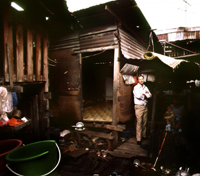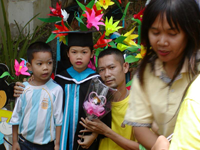Facing poverty
(excerpted from prologue)

“No one chooses to live in a slum,” Father Joe told me in 2000, the first time I saw his shack in a Bangkok shantytown. Its catwalk was planted in a canal that looked like a Basra landfill and smelled like an al-Jummhurriya street. “You’re never there by choice.”
But he’d been living on that catwalk for three decades. By choice. A squeaky-clean room in an air-conditioned Redemptorist monastery was his for the asking a few miles away on a shaded street across from a 7-Eleven. He never asked.
Leaving his slum in 2000, I couldn’t decide if choosing to live in muck and sewage with the poorest of the poor made Father Joe a madman or just madly devoted. But in the long run, perhaps it didn’t matter—masochist, saint, or masochistic saint—because in a void notorious for starving one’s spirit, he was feeding it. And in the act of feeding, he’d been fed. That much was obvious, because beyond the palm trees, rain trees, and indoor plumbing that made his Mercy Centre schools, hospice, and orphanages a shaded utopia in the middle of desperate poverty, there was something else. A palpable, powerful something else ran through the small campus, breathed a sense of joy into children dying. Although I couldn’t fully capture and define it, I’d felt it. That ineffable it.
Returning five years later to investigate what it was that I couldn’t put into words, I narrowed my inquiry to one or two questions. Each, of course, came layered with more.
Why didn’t the children in my affluent Washington, D.C., area cul-de-sac or in my own comfortable home hop and skip at the same excited clip as the sick, dying, orphaned, abandoned, abused, neglected, or otherwise broken children of the Mercy Centre? What in God’s name did Father Joe know that I didn’t?
A Kindred World
(excerpted from foreword by Archbishop Tutu)
In 1990, near the onset of the West’s unprecedented economic growth, wealthy nations pledged that all poor children by the year 2000 would have access to at least a basic education. At the United Nations World Summit for Children in New York City, seventy-three governments signed a declaration that made the goal a global imperative. The Cold War had ended, and a new world order was looking toward greater cooperation and an abundant sharing of resources across international borders and economic lines.
 On the summit’s final day in the General Assembly Hall, U.S. president George H. W. Bush told his fellow world leaders, “All children must be given the chance to lead happy, healthy, and productive lives.”
On the summit’s final day in the General Assembly Hall, U.S. president George H. W. Bush told his fellow world leaders, “All children must be given the chance to lead happy, healthy, and productive lives.”
He acted outraged that “education is a mystery for one hundred million children” in the poorest parts of the world. “Saving one child is a miracle,” he concluded. “As world leaders, we can realize such miracles, and then we can count them in the millions.”
One hundred million children fell through the cracks of that broken pledge. The reasons and excuses are complicated. So in 2000, the pledge was renewed as one of the eight Millennium Development Goals. All UN member states signed a pledge declaring that by the year 2015, “children everywhere, boys and girls alike, will be able to complete a full course of primary schooling.”
 When Father Joe agreed to collaborate on this book in 2005, there were still one hundred million children with no access to a basic primary education. The UN had begun sounding alarms, calling the year a crossroads for the state of human development. Slight improvements have occurred in the years since, though not nearly enough. The vast majority of our uneducated and neglected reside in the shacks of sub-Saharan Africa and South Asia, children like those in Father Joe’s slums who miss school for lack of shoes and milk money.
When Father Joe agreed to collaborate on this book in 2005, there were still one hundred million children with no access to a basic primary education. The UN had begun sounding alarms, calling the year a crossroads for the state of human development. Slight improvements have occurred in the years since, though not nearly enough. The vast majority of our uneducated and neglected reside in the shacks of sub-Saharan Africa and South Asia, children like those in Father Joe’s slums who miss school for lack of shoes and milk money.
Because even as cheap airfare and broadband Internet erase borders and distance, our mightiest barrier is being reinforced. The ever-widening economic divide defines us as strangers.
– Archbishop Desmond Tutu




